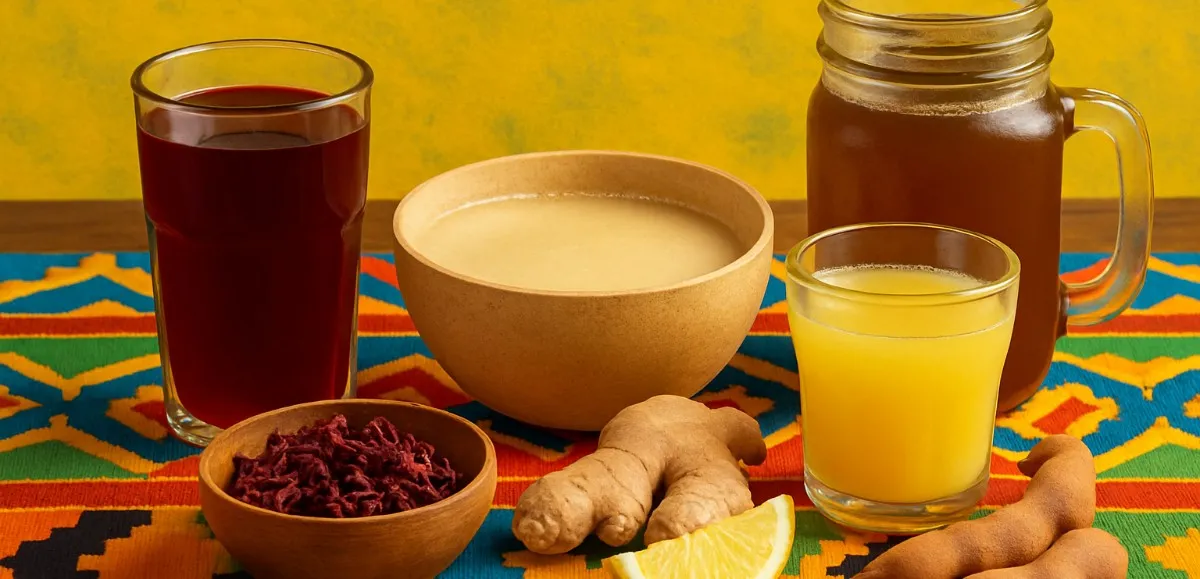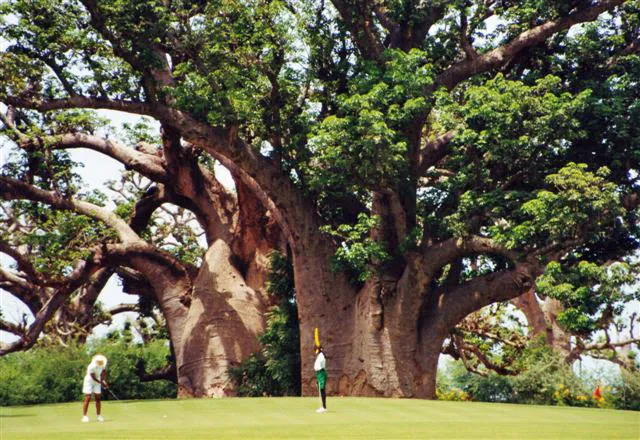The Role of Traditional Drinks in Senegalese Culture
In Senegal, traditional drinks hold a central place in daily life, religious ceremonies, family gatherings, and national festivities. They are not mere refreshments: they are a living expression of cultural, culinary, and medicinal heritage passed down from generation to generation. Made from natural and local ingredients, such as hibiscus flowers, ginger roots, or baobab fruit, these drinks embody a harmony between health, taste, and tradition. Far more than simple juices, bissap, ginger, and bouye are considered elixirs, rich in nutritional virtues and social symbolism.
Their preparation, often artisanal, follows well-codified rituals, specific to each region and each family. These drinks accompany meals, quench thirst in the heat, and are even offered to guests as a testament to Senegalese hospitality. They also fit into a logic of responsible and local consumption, as they valorize local products and short supply chains. In a context of returning to more natural food, traditional Senegalese drinks are increasingly appealing to consumers concerned about their health and eager to discover authentic flavors.
Bissap: The Hibiscus Flower Drink Full of Antioxidants
Bissap is undoubtedly the most emblematic traditional drink of Senegal. Prepared from dried hibiscus flowers (Hibiscus sabdariffa), bissap is distinguished by its intense purple-red color and its acidic, very refreshing taste. It is consumed both fresh as an iced drink and hot as an herbal tea. Very popular in Dakar as well as in the most remote villages, it is often served at ceremonies such as baptisms, weddings, or religious events.

Beyond its inimitable flavor, bissap is recognized for its exceptional antioxidant properties. Rich in vitamin C, polyphenols, and anthocyanins, it helps fight oxidative stress and cellular aging. Numerous studies have demonstrated its benefits for blood pressure regulation, digestion, and immune system strengthening. In traditional African medicine, it is even used to relieve certain digestive or inflammatory disorders.
The preparation of bissap is relatively simple, but requires certain know-how. The flowers are boiled in water, sometimes accompanied by mint leaves, sugar, or a touch of vanilla, before being filtered. Some even add lemon or orange juice to enhance the acidity. Its consumption has now extended internationally, particularly thanks to the Senegalese diaspora, and bissap is increasingly commercialized as bottled juice, infusion, or syrup.
Ginger Juice: An Energizing Drink with Medicinal Virtues
Another essential among traditional Senegalese drinks: ginger juice, locally called “gingembi”. Made from grated ginger roots, this powerful drink with a spicy taste is highly appreciated for its stimulating and toning effects. Ginger is an ancestral medicinal plant, used for millennia in Africa, Asia, and the Arab world for its digestive, anti-inflammatory, and aphrodisiac properties. Its intense taste leaves no one indifferent, and its pronounced aroma gives it a unique sensory identity.

Ginger juice is consumed fresh, with water, sugar, sometimes pineapple or lemon to soften the taste. Its slightly fibrous texture and “warming” effect in the mouth make it particularly pleasant during cool days or after a hearty meal. Rich in gingerols, active anti-inflammatory compounds, this drink is recognized for improving blood circulation, reducing nausea, and strengthening the body’s natural defenses. It is also prized for fighting fatigue and stimulating libido.
In many Senegalese families, ginger juice is prepared artisanally from fresh roots carefully washed and grated. The mixture is then filtered, sometimes spiced with nutmeg or cinnamon, and sweetened according to taste. It can be found in large markets, local restaurants, but also in supermarkets in more industrialized forms. It is a drink that combines tradition and well-being, increasingly popular among lovers of natural flavors and advocates of the “healthy lifestyle”.
Bouye: Baobab Juice with Multiple Nutritional Benefits
Bouye, or monkey bread juice, is an emblematic drink of Senegalese culinary heritage. Extracted from the dry pulp of the baobab fruit — the symbolic tree of Africa — bouye is appreciated for its slightly creamy texture, its sweet and tangy taste, and its exceptional nutritional virtues. The baobab, nicknamed “tree of life”, provides a fruit with numerous medicinal properties, used both in food and in traditional pharmacopoeia.

Bouye juice is particularly rich in soluble fiber, calcium, iron, potassium, and vitamin C. It is ideal for strengthening the immune system, improving digestion, and filling micronutrient deficiencies. For both children and adults, it is often recommended to strengthen bones, revitalize the body, and maintain good hydration, especially during hot periods. Its slightly natural laxative effect also makes it an ally against constipation.
The preparation of bouye consists of soaking the fruit pulp in water until partial dissolution, before filtering the mixture and sweetening it according to preferences. Sometimes milk powder, vanilla sugar, or lemon juice is added to personalize the recipe. The result is a thick, creamy juice, rich in flavors and very nourishing. Consumed at breakfast, as a snack, or during Ramadan, bouye is an integral part of the Senegalese diet, and is also experiencing a rise in popularity in African grocery stores in Europe.
A Culinary Wealth to Preserve and Valorize
Traditional Senegalese drinks like bissap, ginger, and bouye represent much more than consumer products: they are strong identity symbols that reflect women’s know-how, the diversity of local ecosystems, and the resilience of a culinary heritage in constant evolution. While globalization and taste standardization tend to homogenize drinks available on the market, these natural elixirs constitute a precious alternative, both healthy, ecological, and anchored in local realities.

From a sustainable development perspective, these artisanal drinks play an essential economic role. They are often produced by women entrepreneurs, rural cooperatives, or independent artisans, who thus contribute to economic empowerment and the valorization of local resources. The transformation of hibiscus flowers, ginger, or baobab fruit creates a value chain that energizes agricultural sectors and promotes employment in rural areas. The development of “organic” or “fair trade” labels could further strengthen this dynamic.
It is therefore crucial to encourage local consumption and raise awareness among younger generations about the importance of preserving this know-how. Initiatives are emerging in schools, restaurants, gastronomic fairs, or cultural events to help Senegalese themselves rediscover these drinks. In cities, specialized juice bars are beginning to offer these beverages revisited in modern and creative versions. An effective way to combine tradition and innovation.
Traditional Drinks and the Global “Natural Drink” Trend
Today, the success of natural and artisanal drinks extends far beyond African borders. The global “natural drinks” market is expanding rapidly, driven by growing demand for healthy, ecological, and flavorful alternatives. In this context, traditional Senegalese drinks have strong potential for export and international valorization. Bissap, for example, appeals to many consumers in Europe, North America, or Japan, who discover its benefits and exotic flavor.
Senegalese agro-food startups are increasingly investing in the industrialization of these drinks, with modern packaging, quality certifications, and marketing strategies focused on naturalness and authenticity. The challenge is to preserve the taste and nutritional qualities of artisanal recipes while meeting the hygiene, conservation, and logistics requirements of international markets. The development of strong local brands, proud of their identity and committed to responsible production logic, is essential for making these drinks shine on a global scale.
In parallel, African diasporas play a key role in spreading these products. They import not only finished drinks but also raw materials such as dried hibiscus flowers, ginger roots, or baobab powder, which they transform at home or in community businesses. These exchanges contribute to making Senegal’s culinary treasures known and appreciated while generating income for local producers.
Conclusion: Between Tradition, Health and Future, a Liquid Heritage to Savor
Bissap, ginger, and bouye are not simple traditional juices: they embody a worldview, a harmonious relationship between man and nature, a taste for authenticity and well-being. Carried by a rich history and ancestral practices, these beverages now fit into the major trends of healthy, natural, and local food. They deserve to be rediscovered, valorized, and transmitted to future generations, both for their taste dimension and for their health benefits and socio-economic impact.
At a time when consumers seek more transparency, naturalness, and meaning in their food, traditional Senegalese drinks have all the cards to establish themselves as sustainable, authentic, and flavorful alternatives. So, the next time you’re thirsty, let yourself be tempted by a glass of iced bissap, an invigorating ginger shot, or a creamy bouye… And if you’re visiting Senegal, treat yourself to a true culinary immersion with SENEGAL SHUTTLE. Our drivers take you to discover local markets, taste artisans, and the best addresses to taste these 100% traditional drinks. Book your authentic experience with SENEGAL SHUTTLE now!











Leave a Comment